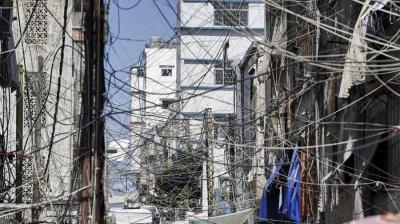The Lebanese state is moving towards an unprecedented approach in managing public debt by assigning a "quasi-default" status to government debts denominated in the local currency, nearly two years after officially declaring a default on international bond payments in foreign currencies. This inevitably suggests a more severe decline in the creditworthiness of sovereign debts, currently classified at the lowest grade (C), indicating a default status with slim hopes for recovery.
Amid disputes arising from the ambiguities left by the recent Cabinet session, "Asharq Al-Awsat" noted significant apprehension in financial circles and among holders of treasury bonds in Lebanese lira regarding the consequences of President Michel Aoun's proposal to refrain from paying interest on internal debts. This is particularly concerning as a substantial portion of these bonds is linked to investments from the "Social Security Fund" and compensation funds belonging to various professional syndicates in both the public and private sectors, in addition to entities and individuals who chose to invest in government debts in lira.
According to the official minutes from the Cabinet meeting, Aoun pointed out that the "budget project includes an amount of 7.6 trillion lira in interest, of which 1.2 trillion are long-term debts to international institutions, and an amount of 6.4 trillion will return with one-third in interests to banks and two-thirds to ('Banque du Liban')." It's important to note that the budget project did not account for interests on "Eurobonds." Consequently, it's presumed that no interest payments will be made on internal debts to "Banque du Liban" and banks, similar to "Eurobonds," and that the 6.4 trillion will be allocated with a 2-3 split for electricity (about 4.266 trillion lira), instead of the previously noted advance, with the remainder for salary increases in the public sector (around 2.133 trillion lira).
As the mechanism for implementing this proposal and the government’s ability to convert it into a financial decision unfolds, Naji Smahan, General Manager of "First National Bank," stated in a statement to "Asharq Al-Awsat" that the very act of the state, in any legal form, suspending interest payments on treasury bonds issued in Lebanese lira "would represent an unprecedented precedent in public debt management, not only at the local level but also globally, which has witnessed numerous cases of defaults in meeting foreign sovereign debts, without including debts in local currencies." Thus, this direction "is unjustified, especially given that the interest rates applied are low compared to countries and markets experiencing very low ratings of sovereign debts."
Aside from directing the deducted amounts toward financing deficits of electricity providers, which alone have consumed around 23 billion dollars as treasury advances, plus the costs of interest deemed part of budget deficits and constituting a significant portion of public debt, Smahan warns of dramatic repercussions on the entirety of the financial sector's assets and institutions due to reckless decisions taken to remove Lebanon from international financial markets two years ago, effectively semi-closing the financing market for local currency "when we assume that any rescue and recovery plan cannot be effective without establishing solid foundations for the sustainability of public debt and meeting the state's obligations to current and future creditors, especially (the International Monetary Fund) and donors or any local or foreign financial institutions that would respond to urgent financing needs according to the promised recovery plan."
Smahan noted that "removing public finances from local currency financing markets will inevitably increase the burden on the Banque du Liban's budget, as it will become the sole financier for budget deficits." Additionally, banks "will necessarily have to nearly zero out returns on deposits and their investment placements," which "will directly harm substantial financial balances belonging to the social security fund and compensation funds related to professional syndicates and others, which invest savings and compensations in treasury bonds denominated in lira," especially since these assets were dramatically impacted by the collapse of the lira’s exchange rate by about 93 percent due to the monetary and financial crises.
According to the latest financial data, the banking sector's share is about 24 percent of the total public debt in lira, which amounts to approximately 91.6 trillion lira, or about 61 billion dollars calculated at the official exchange rate of around 1507 lira per dollar. This percentage is much lower than a third and includes subscriptions belonging to clients. Meanwhile, the non-banking sector's share is around 14 percent, with the largest share concentrated in the "central bank," which alone covers about 62 percent of treasury bonds.
The banking official emphasized that "banks' investments in lira bonds are minimal outside their clients’ deposits," and thus do not benefit from the one-third returns, as is rumored. They invest some assets in lira with the "central bank" at moderate returns that enable them to pay interest on the remaining individual deposits in local currency, which may also be harmed.
On the other hand, it is estimated that the Social Security Fund deploys over 11 trillion lira with "the central bank" and the banking sector. By a decision from its board, it implements a system for investing funds and end-of-service compensation assets in treasury bonds, with no less than 50 percent of the balances, while depositing the other half earning interest in banks for up to one year. These funds are distributed across all operating banks within specific ratios related to the bank's capital to diversify risks.
Regarding the possibility of reducing the already very low deposit interest rates to nearly zero, Smahan stated that "the suspension of payments for government debts issued in dollars around two years ago forced us to nearly erase the yield rates on clients' investments in foreign currencies." The same is expected to extend to lira investments, "which represents a double danger as it leads to sterilizing investment and turns placements into burdens for the banking sector, especially amid the diminishing financing opportunities directed at the private sector to the lowest levels, if not completely nonexistent."




